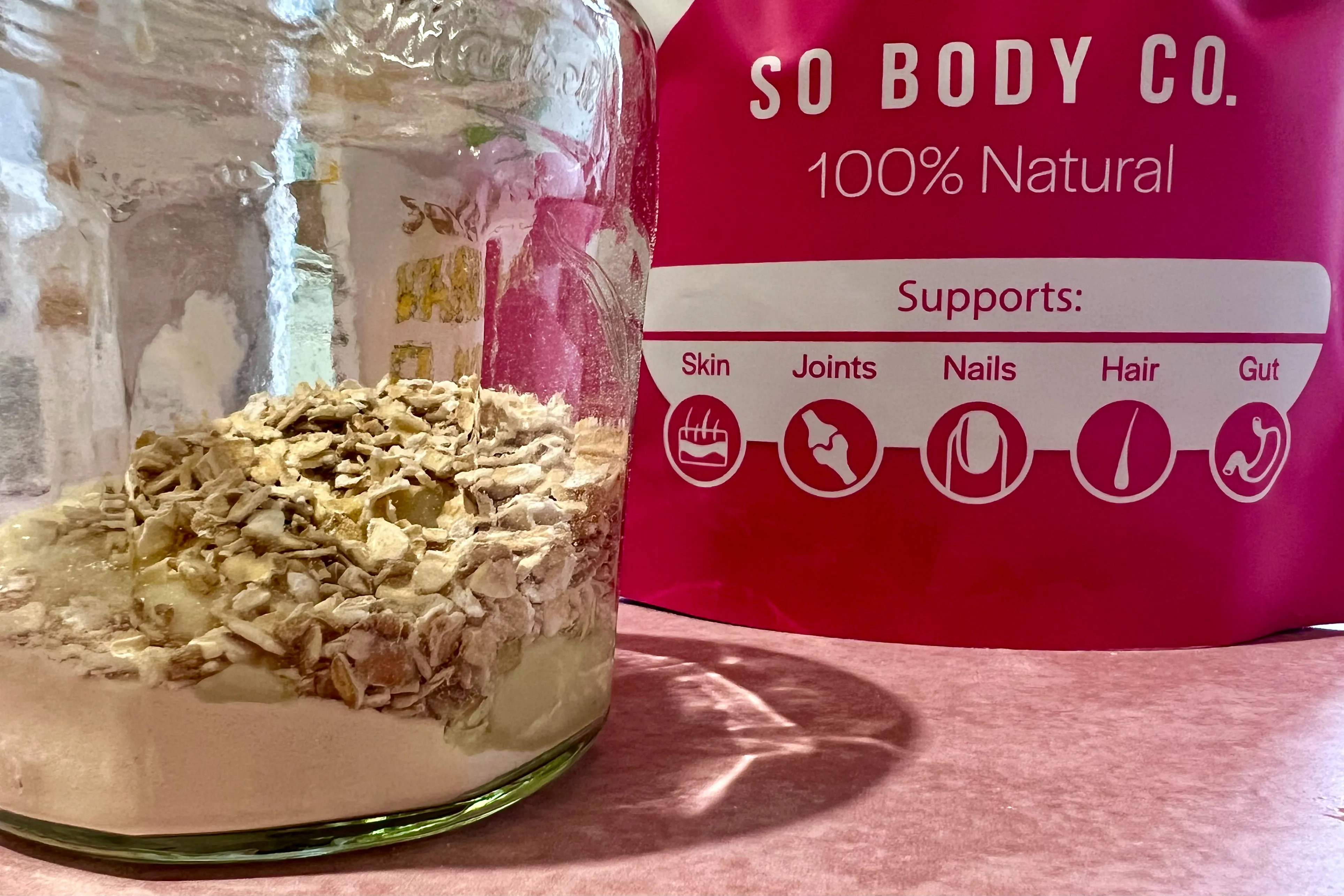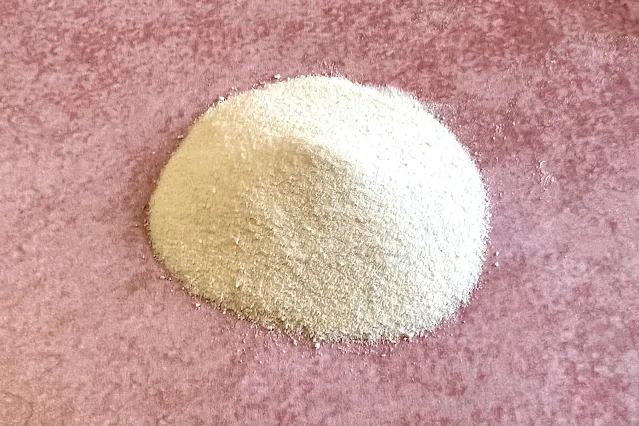(Contains gifted product) Whenever a younger person asks my age I get told “oh you don’t look 40”, but what are they expecting? White hair and wrinkles? A twinset and pearls? With average life expectancy in the UK 80.9 years writing off women over 40 is pretty depressing. While we should recognise we have plenty of life ahead of us it’s also worth acknowledging that in our forties our bodies our changing. If we want to support our body to last us for another 40 or more years we need to review how we look after ourselves. I have a growing interest in the impact collagen supplements can have on women my age so I am happy to have found an easy to take collagen supplement to review. Read on to find out what is different about So Body Co Peptigen+ compared to other collagen I have tried.
 |
| Is it worth taking collagen supplements? |
About Collagen Supplements and So Body Co Peptigen+ Multi Collagen Review
What Is Collagen and Why Do Women Need To Pay Attention To It?
Collagen is a protein which has a key role in supporting the structure of our cells and tissues. There are lots of different types of collagen, but type 1 collagen is the most widely found in the human body accounting for about 90% of our collagen. Collagen plays an important role at the cellular level to repair and maintain tissue as well as in our immune response.
Cells called fibroblasts produce and maintain collagen from animo acids, but the functioning of these cells deteriorates as we get older and collagen production slows. Along with the loss of another protein (elastin) this leads to sagging skin and wrinkles. It is thought that the reduction in collagen is at least partly caused by hormonal changes from the perimenopause onwards. The perimenopause is when women’s hormones start to change, but before periods stop completely. The average age for this to start is 47, but many people are reporting symptoms much earlier and as highlighted recently by Davina McCallthere is a huge lack of understanding in this area.
Some studies have shown that women’s skin loses about 30% of it's collagen during the first 5 years of the menopause and then about 2% every year for the next 40 years. Whereas other studies report that the body can lose around 1% of it's collagen a year after the age of 40.
Of course it’s not just age that impacts collagen: smoking and excessive drinking are shown to reduce collagen production. It is also thought that diets high in sugar and ultra-processed food as well as high levels of sun exposure can break cause collagen to break down faster.
Are Collagen Supplements Any Good?
If our body is losing the collagen we already have and we are making less of it, is there anything we can do to increase or even maintain our collagen levels? Thankfully yes. While we eat collagen in our diets (eg chicken skin and bone broth) or foods that contain the amino acids used to make collagen, there are studies showing that some groups will benefit from collagen supplements. Collagen supplements are available in powder, capsule and liquid form usually as hydrolysed collagen.
My interpretation of the literature (and I might be wrong) is it is easier for our bodies to use the hydrolysed collagen we consume than collagen itself. With hydrolysed collagen the protein has been broken down to peptides which are short chains of the amino acids our body uses as building blocks to create it’s own collagen.
While just providing more of the building blocks doesn’t necessarily mean our collagen levels will increase, it makes sense that providing them gives our bodies the best chance to make as much of the protein as it can.
While there needs to be more independent scientific research, there are plenty of studies that show that taking collagen supplements long term can have beneficial results, especially for those who have declining levels of collagen like women over 40.
Numerous studies of women have found that taking Women’s Hydrolyzed Collagen Complex supplement improves skin hydration, elasticity and wrinkles as well as joint health. There are less studies but still some evidence that taking collagen peptides longterm can significantly increase bone mineral density in postmenopausal women (a group who are at increased risk of osteoporosis).
To look at it another way: what’s the harm? Can taking collagen be bad for you? There is the financial cost to be considered of course: good quality collagen supplements are not cheap so it is an investment in your body each month. Few people report negative side effects after taking collagen supplements and these are mainly mild digestive issues. The exception to this of course is if you are allergic to the ingredients eg seafood which may be used to make marine collagen.
So Body Co recommend that their products aren’t used by those who are pregnant or breastfeeding. Collagen supplement companies can't claim their products are safe for use by these groups because studies into the impact on pregnant or breastfeeding people would be unethical. However there is no evidence of harm and generally consuming high levels of protein through a balanced diet is beneficial in pregnancy.
 |
| I received So Body Co Peptigen+ Multi Collagen to review |
Reviewing So Body Co Peptigen+ Collagen
Collagen supplements can taste really unpleasant, I don't like the taste of Peptigen+ from So Body Co on it's own (or any of the ways they suggest it like in coffee???), but mixed into yoghurt I can't taste it.
This product doesn’t contain dairy, but it isn’t suitable for vegetarians or vegans. Vegan collagen supplements contain the amino acids to form collagen from plants, rather than hydrolysing collagen to an easier form for the body to absorb.
While some collagen supplements include just one type of collagen, Peptigen+ contains the 5 types of collagen most widely used by the body: type 1, type 2, type 3, type 5 and type 10. These are from marine, bovine and egg collagen sources. It is hydrolysed to peptides to make it easier to absorb. The daily does of 10g of Peptigen+ contains 9g of protein, no fat and no carbohydrate.
To ensure your body has the best chance to maximise production of collagen you should use Peptigen+ alongside a balanced diet. You might also want to consider taking additional vitamin C as this is essential for collagen production. So Body Co sell a Gorgeous Greens powder which has high levels of Vitamin C and is designed to complement their collagen products. They also sell a meal replacement shake powder called CollaSlim which has 5g of hydrolysed Type 1 collagen in. I couldn't try that though because it contains milk.
 |
| So Body Co Peptigen+ is a powder containing hydrolysed collagen you can add to drinks or food |
My experience with Taking Collagen
Collagen sounds amazing doesn’t it? I have high expectations that it can help my skin, hair and joints, but I’m also realistic. Most studies show it takes a few months for results to be seen, which makes sense. Your skin doesn’t instantly renew does it? How much does hair grow in a month? If someone says they have thicker hair after a month and they have shoulder length hair or longer I am going to be dubious.
I have previously used a collagen product for a month, but I didn’t like the taste and it was expensive so I couldn’t bring myself to buy more. I didn’t see a difference in those 4 weeks, but I think you should give collagen supplements 2 to 3 months to see what differences you notice. I used So Body Co for about 6 months and while I noticed a difference, particularly after I stopped using it after the first few months I wasn't taking it every day. Mostly because I forgot and also because I wasn't always eating foods that I could mix it in easily (and I don't like the taste in drinks).
I think the So Body Co collagen is a good option if you are looking for multiple types of collagen in your supplement, eg Type II is particularly good for joint pain. If you can find a way to fit taking it daily into your lifestyle it's worth a try. Sign up to their mailing list and you will find out about their offers.


















No comments
Thanks for your comment (unless it's spam in which case, why?)